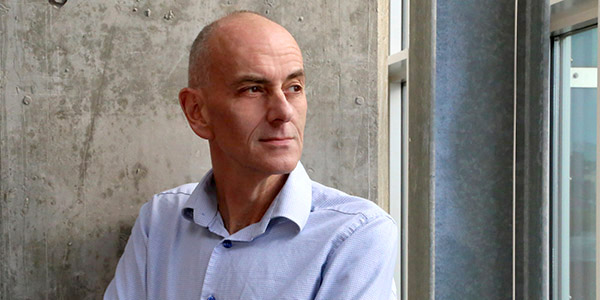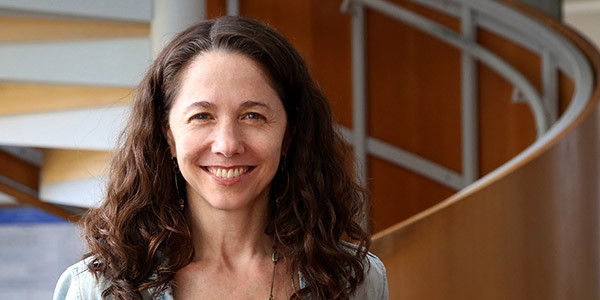Computing and AI: Humanistic Perspectives from MIT
Philosophy | Alex Byrne and Tamar Schapiro

Action
“The MIT Schwarzman College of Computing presents an opportunity for MIT to be an intellectual leader in the ethics of technology. The Ethics Lab we propose could turn this opportunity into reality.”
Alex Byrne is head of MIT’s Department of Linguistics and Philosophy; he is also head of the Philosophy Section. His main research interests are philosophy of mind, epistemology, and metaphysics. He is the author of Transparency and Self-Knowledge (Oxford University Press, 2018) and co-author (with G. Rosen et al.) of The Norton Introduction to Philosophy, 2nd ed. (Norton, 2018).
Tamar Schapiro is an associate professor of philosophy at MIT. Her primary research interests are ethical theory, history of ethics, practical reasoning, and human agency. She is currently working on a book tentatively titled Feeling Like It: A Theory of Inclination and Will.
• • •
Q: What are some examples of domain knowledge, perspectives, and methods from philosophy that should be integrated into the research and curriculum of the MIT Schwarzman College of Computing (SCC) and why?
Philosophy has been centrally involved in the development of computer science since the mathematician and philosopher Gottlob Frege formulated modern logic in the late 19th century. Alan Turing’s famous 1950 paper, “Computing Machinery and Intelligence,” appeared in the British general interest philosophy journal Mind. And the intellectual foundations of ethics — applied or theoretical — lie in philosophy, going back to Aristotle and beyond.
There is an increasing awareness of the importance of ethical thinking in the realm of technology, reflected in one of the aims of the SCC: to “transform education and research in public policy and ethical considerations relevant to computing and AI.”
“An ethical approach to AI,” Stephen A. Schwarzman writes, “requires coming up with a long-term understanding of the values we want to see reflected in this technology — and shaping rules that create confidence…. They won’t come from Silicon Valley alone.”
Computing and AI pose many ethical problems, related to privacy (e.g., data systems design), discrimination (e.g., bias in machine learning), policing (e.g., surveillance), democracy (e.g., the Facebook-Cambridge Analytica data scandal), remote warfare, intellectual property, political regulation, and corporate responsibility.
Social and political philosophy and other relevant ethics-related fields are now thoroughly interdisciplinary, drawing on economics, sociology, political science, anthropology, science and technology studies, and so on. The ethics of technology is still a nascent field, with relatively little published work of the sort of quality and originality that drives exciting research programs and generates PhD theses at the top philosophy programs. However, there are signs of impending change across the discipline, and the pace is likely to quicken.

Action
“The central mission of the Ethics Lab would be to coordinate and provide teaching in the ethics of technology, both in the College of Computing and across the Institute generally. The lab would also produce collaborative research and be a resource for expert advice and consultation to the faculty and administration.”
Although there are initiatives in the ethics of technology across the Institute, these are currently fragmented and uncoordinated, and the supply of qualified personnel presents another problem. Given the emphasis on the importance of ethics to the college, this situation will only get worse under the status quo. We need to transform fragmentation into unity, firmly embed ethics in the SCC, and bring in the appropriate world-class specialists.
The solution, we think, is a new unit at MIT — the Ethics Lab. The central mission of the lab would be to coordinate and provide teaching (undergraduate and graduate) in the ethics of technology, both in the SCC and across the Institute generally. The lab would also produce collaborative research and be a resource for expert advice and consultation to the faculty and administration.
The SCC presents an opportunity for MIT to be an intellectual leader in the ethics of technology. The Ethics Lab could turn this opportunity into reality.
Q: What are some of the exciting, meaningful opportunities that advanced computing is making possible in your field?
The emergence of massive open online courses (MOOCs) is one important development; these classes are helping to bring philosophy to a broader audience. Putting humanities courses online presents difficult challenges, especially in reproducing the essay component; nevertheless, the Philosophy Section has been an enthusiastic producer of MOOCs on the MITx platform. We currently have three (Introduction to Philosophy, Paradox and Infinity, and Minds and Machines), and another on ethics is in production. Advances in computing will bring us ever closer to the goal of faithfully simulating the experience of taking philosophy at MIT.
AI can be used to solve problems in astronomy, genetics, neuroscience, architecture, and so on — even problems in the analysis of literary texts. Perhaps fortunately for us, philosophical problems remain immune to solution by computational methods. Computing will continue to transform the world, but philosophy will fundamentally remain a human endeavor.
Related Publications
Computing, Ethics, and AI: The Tools of Moral Philosophy
by MIT Philosophers Kieran Setiya and Caspar Hare
Transparency and Self-Knowledge (OUP, 2018)
By Alex Bryne
The Norton Introduction to Philosophy, 2nd ed. (Norton, 2018)
Co-authored by Alex Byrne, with G. Rosen et al.
Profile: Tamar Schapiro
What we’re doing when we try to live our lives well: Philosopher Tamar Schapiro studies how we blend reason and emotion while refining our adult selves.
Ethical Ai by Design
Interview with Abby Everett Jaques, MIT Philosophy, PhD ’18
MIT postdoctoral associate is bringing philosophical tools to ethical questions related to information technologies.
Algorithmic Fairness
by Cosmo Grant, Digital Learning Lab Fellow, Department of Linguistics and Philosophy
Series prepared by SHASS Communications
Office of Dean Melissa Nobles
Series Editor and Designer: Emily Hiestand, Communications Director
Series Co-Editor: Kathryn O’Neill, Associate News Manager
Published 23 September 2019